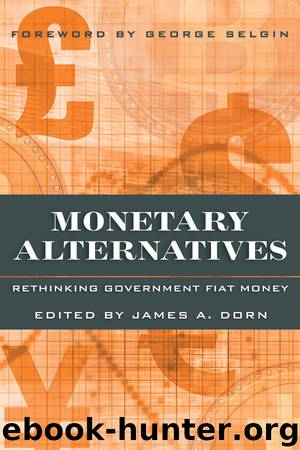Monetary Alternatives: Rethinking Government Fiat Money by James A. Dorn

Author:James A. Dorn [Dorn, James A.]
Language: eng
Format: epub
Tags: ebook
Publisher: Cato Institute
Published: 0101-01-01T00:00:00+00:00
Productivity, Equity, and the Price Level
Many economists have denied that a stable-valued money unit is desirable, even apart from the difficulties of achieving one. They go beyond acknowledging complaints about how unexpected price inflation or deflation redistributes wealth between creditors and debtors. Even the distributional effects of stability, especially in the face of changes in productivity, draw criticism. David Davidson (1906 and other articles listed in the references) invented hypothetical examples. Stable prices would keep a creditor from sharing in the gains from a general rise in productivity, while someone who had borrowed for productive purposes would unfairly keep the entire gain for himself. A rise in the productivity of land would tend to depress the prices of its products and so not unambiguously either raise or lower the value of the land itself. A monetary policy of stabilizing the product price level, however, would raise land’s money value. A landowner who had leveraged his holding by debt would gain relative to a debt-free owner, which seemed unfair to Davidson.
Selgin (1990: 273–75), resurrecting related arguments, contends that when the price level falls because of generally improved productivity, debtors do not suffer, since their real incomes rise along with the real value of their debts. All they miss is an opportunity to enjoy an undeserved windfall at creditors’ expense. In the opposite case of an adverse supply shock, preventing a rise in the price level would require an unfair contraction of all nonfixed money incomes.
Such arguments about the distributional unfairness of stable prices seem weak in the context of a long-term productivity uptrend. Investors, lenders, business firms, and other borrowers will allow for expected productivity gains in interest rates, in equity participations in loans, in issue prices and other features of corporate stocks, and in innumerable other terms of their financial transactions.
Worry about unfairness from adverse supply shocks seems more plausible. If, however, the monetary system is credibly committed to price-level stability even despite shocks, people will allow for their possibility in making contracts, including the mix of loan and equity elements in financial transactions. On this particular score, long-term loans will bear lower interest rates than they would in the absence of the price-level guarantee. In effect, long-term lenders pay an insurance premium for shock protection by accepting lower interest rates than if they bore the risk themselves. If an adverse shock does occur and creditors gain from a price level nevertheless kept stable, then they are in a position like that of a householder who “benefits” from having been insured (and having paid the premiums) when his house burns down. People and firms owing debts fixed in a stable unit of account do lose from an adverse supply shock, but they had presumably seen an advantage in borrowing at a lower rate of interest than they would have had to pay on loans denominated in a depreciation-prone unit; they are in the position of insurance companies.
To change the analogy, people who gain from holding claims denominated in a stable
Download
This site does not store any files on its server. We only index and link to content provided by other sites. Please contact the content providers to delete copyright contents if any and email us, we'll remove relevant links or contents immediately.
International Integration of the Brazilian Economy by Elias C. Grivoyannis(110146)
The Radium Girls by Kate Moore(12018)
Turbulence by E. J. Noyes(8040)
Nudge - Improving Decisions about Health, Wealth, and Happiness by Thaler Sunstein(7693)
The Black Swan by Nassim Nicholas Taleb(7109)
Rich Dad Poor Dad by Robert T. Kiyosaki(6612)
Pioneering Portfolio Management by David F. Swensen(6288)
Man-made Catastrophes and Risk Information Concealment by Dmitry Chernov & Didier Sornette(6007)
Zero to One by Peter Thiel(5786)
Secrecy World by Jake Bernstein(4741)
Millionaire: The Philanderer, Gambler, and Duelist Who Invented Modern Finance by Janet Gleeson(4465)
The Age of Surveillance Capitalism by Shoshana Zuboff(4276)
Skin in the Game by Nassim Nicholas Taleb(4239)
The Money Culture by Michael Lewis(4198)
Bullshit Jobs by David Graeber(4179)
Skin in the Game: Hidden Asymmetries in Daily Life by Nassim Nicholas Taleb(3991)
The Dhandho Investor by Mohnish Pabrai(3759)
The Wisdom of Finance by Mihir Desai(3735)
Blockchain Basics by Daniel Drescher(3574)
